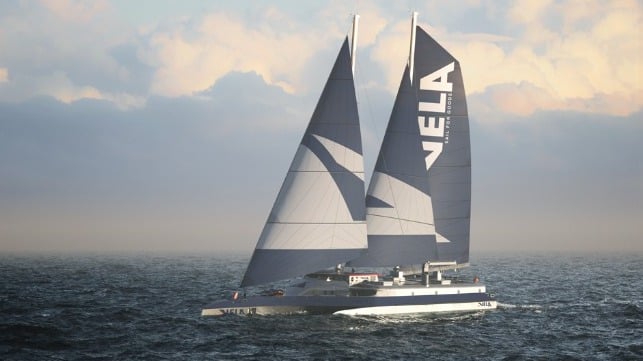Construction Update as Wind-Powered Cargo Trimaran Gets Biopharma Customer

Construction on what is being billed as the first of a fleet of wind-powered cargo trimaran vessels is proceeding as the French company Vela Transport reports it has booked a major biopharmaceutical client for the service. Last fall, the company reported it had raised the capital for the construction of its first vessel and expects to launch its transatlantic cargo service in late 2026.
Japan’s Takeda Pharmaceutical has signed an agreement to become the first biopharmaceutical company to transport products on the new service. The company, which is focused on treatments including gastrointestinal and inflammation, rare diseases, plasma-derived therapies, oncology, neuroscience, and vaccines, highlights that it will use the wind-powered trimaran as part of its goals to incorporate net-zero into its value chain by 2040.
Vela highlights that the vessel, which they are calling L'avion des Mers (The Airplane of the Seas), is purpose-built to handle pharmaceutical products. It will have a capacity for 500 US pallets (600 EUR pallets) aboard the 220-foot (65-meter) vessel. The cargo areas will feature a compliant refrigeration system that is temperature-controlled and powered by renewable energy generated onboard. The seven refrigerated holds meet pharmaceutical standards.

The vessel is currently being built at Austal Philippines’ Balamban in Cebu, Philippines. The company recently highlighted that the two carbon-fiber masts are in the final stage of construction. Each will stand 171 feet (52 meters) and give the vessel a total sail area of 6,700 square feet. At sea, they anticipate a speed of 14 knots entirely from wind power. It will also have 2,583 square feet of solar panels.
Vela plans to leverage offshore racing technologies, direct routes, and more efficient port operations through secondary ports to provide a fast cargo service. Voyages are project to take two weeks sailing between Normandy and Bordeaux in France and New Jersey, in the United States.
Hull construction is also well underway. On June 30, Austal completed the turnover of the hull in its building hall. Approximately 30 percent of the key components for the vessel, including rigging, sails, and hydro-generators, are being supplied by French companies.
The vessel is being built entirely of aluminum. They also report that to support sustainability, the vessel and its components are designed to be dismantled either for reuse or recycling.

that matters most
Get the latest maritime news delivered to your inbox daily.
Vela highlights other unique features of the design. Using a trimaran, the ship will have inherent stability. They report that it is expected to be the only cargo sailing vessel that does not use water ballast. At sea, it will be 100 percent wind powered, and to meet maritime requirements, it will have an engine that will be primarily powered by electricity from batteries, solar, and hydrogeneration onboard for maneuvering in port. As a backup, it will also have marine diesel fuel, but they anticipated minimal use of the engine.
The plan calls for a fleet of sailing cargo vessels. By 2028, the company plans to have five vessels to provide weekly sailing and transport up to 48,000 tons of goods per year.
